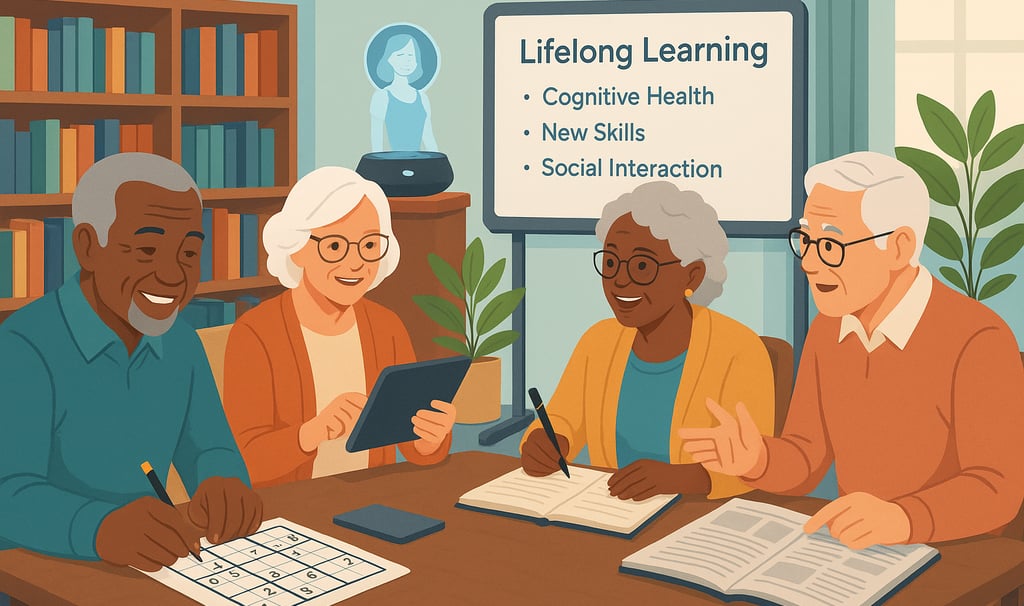Lifelong Learning: How Staying Curious Keeps Seniors Mentally Fit
Learning doesn’t stop after school—it’s a lifelong adventure. For seniors, staying mentally active by picking up new knowledge or skills helps maintain cognitive function, reduce the risk of dementia, and provide a meaningful sense of accomplishment and connection.
Lawrence Hobart
5/30/20252 min read


Welcome back to CareTec’s special series on senior health and wellness! Each entry in this series is designed to support the mental, physical, and emotional wellbeing of older adults. At CareTec, we believe in empowering seniors and caregivers alike with smart, AI-driven tools that enhance quality of life and encourage healthy routines.
In our previous blog, “The Healing Power of Nature: Why Seniors Benefit from Time Outdoors,” we explored how fresh air, sunlight, and green spaces can lower stress, lift mood, and even improve sleep. Nature truly is one of the simplest—and most powerful—wellness tools we have.
This week, we’re turning our attention to something just as vital: the curiosity of the mind. Engaging in lifelong learning doesn’t just stimulate the brain—it brings joy, purpose, and a sense of growth at any age. Let’s explore why continuing to learn is one of the best things seniors can do for their mental health.
Lifelong Learning: How Staying Curious Keeps Seniors Mentally Fit
Learning doesn’t stop after school—it’s a lifelong adventure. For seniors, staying mentally active by picking up new knowledge or skills helps maintain cognitive function, reduce the risk of dementia, and provide a meaningful sense of accomplishment and connection.
Why Learning Is So Good for the Brain
Mental stimulation is just as important as physical activity when it comes to healthy aging. Here’s how learning helps:
Supports cognitive health – Learning challenges the brain, helping form new connections and strengthen memory.
Boosts mood and confidence – Accomplishing a new skill can be deeply satisfying and promote a positive self-image.
Reduces feelings of isolation – Group classes or shared learning activities can provide a social outlet.
Encourages purpose and curiosity – Seniors who pursue new interests feel more engaged in life and curious about the world around them.
Easy Ways Seniors Can Keep Learning
Lifelong learning doesn’t require enrolling in a university. Here are accessible ways seniors can challenge their minds:
Online classes – Platforms like Coursera, Udemy, and YouTube offer free and affordable courses on everything from art history to computer skills.
Local library programs – Many libraries host book clubs, lectures, or tech lessons for seniors.
Language learning apps – Tools like Duolingo or Babbel can help seniors explore new languages in a fun, low-pressure way.
Documentaries and educational TV – Watching informative programs can be both relaxing and enriching.
Hobby groups – Joining a knitting circle, chess club, or photography group brings learning and socializing together.
Journaling or blogging – Reflecting and writing about new knowledge helps reinforce memory and critical thinking.
Tips for Getting Started
Not sure where to begin? Try these suggestions:
Start small – A short video or article a day can spark momentum.
Follow your interests – Choose topics that genuinely excite and motivate.
Make it social – Invite a friend to learn something new together for added fun and accountability.
Use tech support – If learning online is new, ask for help getting started with devices or platforms.
How Technology Can Help
Digital tools can track engagement, alert caregivers to signs of cognitive decline, and support personalized care plans that include intellectual enrichment activities. Because healthy aging includes nurturing the brain—not just the body.
Disclaimer
This blog is for informational purposes only and does not replace professional medical advice, diagnosis, or treatment. Always consult a healthcare provider if you have concerns about cognitive health or mental well-being.
©2025 CareTec.AI
Melbourne: 101 Collins St Melbourne VIC 3000 +613 9999 7379
Sydney: 2 Chifley Square, Sydney NSW 2000 +612 8880 0307
Queensland: 46 Cavill Ave, Surfers Paradise QLD 4217 +617 3667 7473
Texas: 200 W 6th St, Austin, TX 78701 +1 (737) 7101 776
London: 22 Bishopsgate, London EC2N 4AJ +44 (020) 4577 4024


